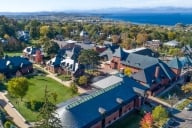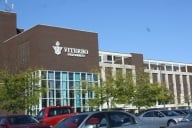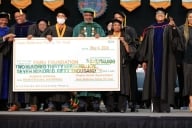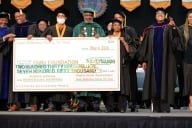You have /5 articles left.
Sign up for a free account or log in.
A new book by a fund-raising consultant is highly critical of Princeton University’s handling of what was once the largest donation it ever received – a 1961 gift that became the center of high-profile donor intent lawsuit 40 years later.
Doug White’s findings, based on extensive interviews and documents, could be viewed with skepticism because one of the parties in the lawsuit -- not Princeton -- paid White a consulting fee, something the author does not disclose in the book.
In an interview, White said the protagonist of his tale, Bill Robertson, paid him two months of consulting fees. White, who teaches master's-level courses in fund-raising at Columbia University, said he needed the fees while he decided whether to do the book, which Robertson also suggested he write.
Robertson's financial support “had nothing to do with the research, it had nothing to do with the conclusions,” White said.
Bill Robertson is the son of Charles and Marie Robertson, who donated nearly $35 million to Princeton in 1961, a sum that eventually grew because of investment returns to $900 million before the case was settled. The money was intended to help fund the Woodrow Wilson School, Princeton’s public affairs program.
In 2002, Bill Robertson and his siblings decided to take on Princeton for what they saw as the university’s mishandling of his family’s money, which was overseen by the Robertson Foundation, whose board had representatives of both the family and the university. The Robertsons argued the university was not using the family’s largesse to help train public servants, and they wanted the foundation’s money freed up to be used somewhere other than at Princeton.
White’s book Abusing Donor Intent: The Robertson Family’s Epic Lawsuit Against Princeton University (Paragon House) clearly comes down on the side of the Robertson heirs who sued Princeton.
The book contains startling details about Princeton as well as about the Robertsons.
It makes the case that Princeton may have veered away from Charles and Marie’s intent by siphoning money earmarked for public servant training to other parts of the university. Princeton declined to comment on the book but has maintained the Robertson heirs -- and not Princeton -- are guilty of diverting money from its intended use by trying to take the money from Princeton.
Princeton agreed to pay $50 million plus interest over seven years to a Robertson family-controlled charity to settle the case.
There are touching details and a compelling narrative about the Robertsons and how they came into their money.
At times the sympathy may seem syrupy: the epilogue, titled “I’m Proud of You,” is an imaginary letter White writes on behalf of Bill Robertson’s deceased father congratulating the son for showing a “great deal of mettle as you kept the interests of your mother and me at the heart of your battle.” Asked about ghostwriting for the dead, White said, “I just dreamt that up one night.”
White did get a good deal of access. His interviews include Robertson allies; Princeton’s legal team; the former Federal Reserve Chairman Paul Volcker, who criticized Princeton’s training of its students for public service; the Nobel Prize winner James Watson, who benefited from another donation by the Robertson family; and former President George H.W. Bush, whose namesake public affairs institute at Texas A&M University received money from the Robertsons after the case with Princeton was settled.
White’s account tends to side with the idea that Princeton did not do what Robertsons intended.
For instance, the family commissioned an audit by PricewaterhouseCoopers showing that Princeton had improperly spent $217 million of the Robertsons’ donation for things like overhead and improper administrative charges.
Princeton’s lawyers sat down with White to talk about the case, so the account has some balance. White said Bill Robertson exercised no editorial control, despite the two months of pay he provided; White declined to say how much he received. All White’s sources, including, he said, Princeton's lawyers, were allowed to approve quotes before they were published.
White said when he first heard about the case he sided with Princeton – “Princeton’s Princeton, they’re a pretty good place, they don’t screw around,” White remembers thinking. But he ended up seeing it the other way around.
Princeton declined to comment on the book and referred questions to a statement from around the time the case was eventually settled in 2008.








